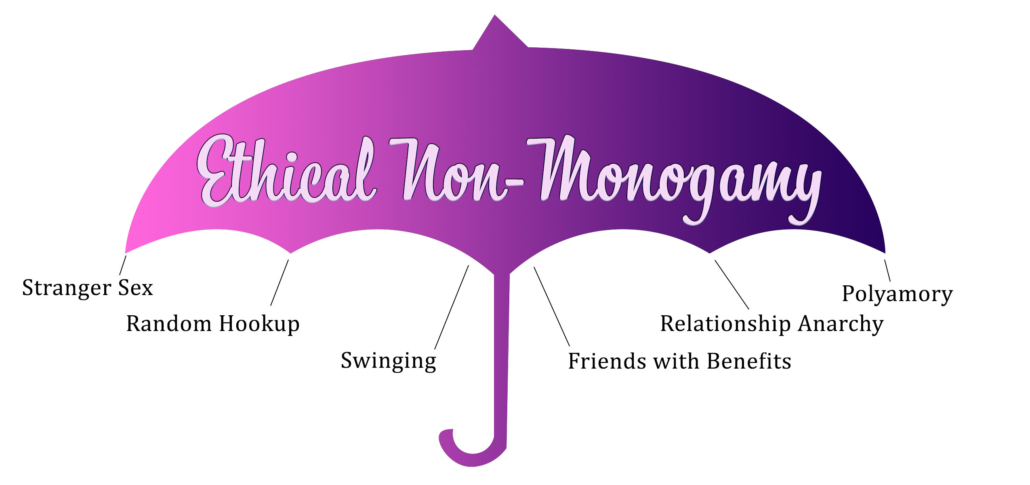Ethical Non-Monogamy – Opening up your sexual relationship
Ethical non-monogamy (ENM) has become a life choice for an increasing number of people, both single and within relationships.
It is common, these days, to hear about ENM, open relationships, swinging and polyamory. While not exactly mainstream, it is a valid option to consider for people who struggle to make traditional monogamous relationships work for them, or find that they naturally develop romantic or sexual feelings towards more than one person in parallel.
What Is Ethical Non-Monogamy?
To understand ethical non-monogamy, let’s first look at monogamy. Monogamy is the practice of staying with one sexual partner for the duration of that relationship. If you enter into sexual relations with another person during that time, you are no longer considered monogamous. Therefore, non-monogamy means having multiple sex partners.
Understanding Ethical Non-Monogamy
Having multiple partners is not for everyone, and that’s okay. Most people are in committed relationships with just one person. However, it’s estimated that over one-fifth of Americans have engaged in consensual non-monogamous relationships (21.9%).
Unfortunately, those interested in multiple partners often lack social support and understanding. Since ethical non-monogamy is a relatively new concept, it can be difficult to breach the topic with friends, family, neighbours, and co-workers. There are also harmful stereotypes about the kinds of people that don’t want to commit to only one person.
When couples make the consensual decision to embark on this non-traditional journey, it can be challenging. However, the partners that receive help in the beginning stages have a greater chance at success-and you can, too!
Why Do People Enter Non-Monogamous Relationships?
Here are some of the more common reasons why people don’t commit to just one person:
- They want to explore their sexuality. To some people, one partner at a time makes them feel like they can’t explore their sexuality to the fullest. Ethical non-monogamy allows them to explore their sexuality while still being fully committed to one person.
- They love more than one person at a time. Some people are programmed to romantically love two or more people, and feel monogamy holds them back from their truest self.
- Partners believe monogamy is the product of jealous or possessive feelings. Non-monogamy involves letting go of these feelings to experience more love.
- Some people like having variety in their sex life, and ethical non-monogamy allows them to do so without negative consequences.
- One partner may not be able to meet all of their needs. In some cases, a partner may not be in a position physically, mentally, spiritually, or emotionally to have sex. One person may be into BDSM but their partner is not. In this case, non-monogamy allows these desires to be fulfilled by a different person.
What Is Ethical Non-Monogamy?
When most people think of non-monogamy, they don’t associate it with rules, but to be ethically non-monogamous, you and your partner must agree to a contract. This will outline what does and does not count as infidelity, and both must be equally on board. If not, resentments will grow.
Most people share society’s view of non-monogamy as unethical, regardless of consent. Yet, many married people are unfaithful. About a quarter of men and about 15 percent of women cheat. However, ethical non-monogamy has an ingredient cheating lacks: open and honest communication. When someone is cheating, they aren’t communicating ethically. They are lying, deceiving, and disrespecting their partner. In ethical non-monogamy, there is ethical communication. All people involved reveal as much as they agree to in the contract. For some couples, this might be every detail of who, what, when, and where. Others might not want to know more than a name.
Types of Non-Monogamy
There are many different types of non-monogamous relationships, and all require ethical communication and agreement. These include:
· Polygamy. We’ve all heard of polygamy. To be considered a polygamist, you must marry more than one person. Polygamy is mentioned in many religious texts, and some sects still practice it.
· Open Relationship. Open relationships are when at least one person in a committed relationship is open to sex with other people. They require much communication, which can change over time as the partnership evolves. It’s become an umbrella term for any non-monogamous sexual relationship.
· Swinging. The concept of swinging is often a trope. Put simply, swinging is when couples exchange partners. Swinging can involve partners, clubs, friends, parties, and so on.
· Monogamish. In the past few years, Dan Savage has popularized the term monogamish. Monogamish is when a couple is mostly monogamous but allows the occasional sexual relationship with others. Like other ethically non-monogamous relationships, there are many rules the participants must follow. These determine things such as the frequency of partners, frequency of meetups, and types of sexual activities. Ultimately, it’s up to the couple to decide.
· Polyamory. Polyamory is when someone is in an open relationship with multiple people at once. It can be sexual or romantic, and everyone involved in the polyamory circle stays informed through ethical communication. Polyamory is different from polygamy, as marriage is not involved. It may also involve multiple but separate committed partners.
· Relationship Anarchy. Relationship anarchists want to end the barrier between sexual and non-romantic relationships. Our society values sexual relationships over friendships. Relationship anarchy wants to judge the value of relationships on a case-by-case basis, independent of sex. According to relationship anarchists, every relationship is unique and evolves with time. A relationship anarchist may believe in the abundance of love, and that people can have as many relationships as they want.
Roy Graff – Consultant in Ethical Non-Monogamy
I have been openly and ethically non-monogamous for nearly 10 years, experiencing a range of relationship dynamics including open relationship, solo-poly, primary and non-hierarchical poly relationships. I’ve lived on 4 continents, travelling extensively and immersing myself in very different cultures. For the past 5 years, I have given talks to audiences ranging from 10 to 300 people and facilitated workshops on consent, polyamory, radical honesty and BDSM. I founded a London based men’s support group for alternative relationships and am co-organiser of Sex Geekdon London, a sex-positive discussion and information group.
If the below applies to you as a single individual, a couple, or a policule of any configuration, perhaps I can be of assistance:
- You are looking for answers, advice and guidance to navigate your exploration of ENM
- You are struggling with emotions that people around you cannot comprehend or help with
- Your experiences of ENM has given rise to feelings of harmful jealousy and insecurity, damaging the relationship
- You know you are non-monogamous and want to learn how to do this ethically, with honesty and integrity
- You want to know how to start, where to meet people and communicate your needs to them
What Roy offers:
Advice, coaching, mentoring, consulting – call it what you like. I am here to help you navigate a new world and avoid potholes in the road (which I’ve fallen into in the past). I offer advice in a non-judgemental, sex-positive, open-minded, inclusive environment. Email for more details.







